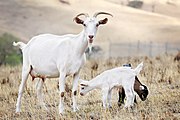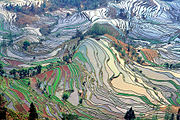Portal:Agriculture

Agriculture encompasses crop and livestock production, aquaculture, and forestry for food and non-food products. Agriculture was a key factor in the rise of sedentary human civilization, whereby farming of domesticated species created food surpluses that enabled people to live in cities. While humans started gathering grains at least 105,000 years ago, nascent farmers only began planting them around 11,500 years ago. Sheep, goats, pigs, and cattle were domesticated around 10,000 years ago. Plants were independently cultivated in at least 11 regions of the world. In the 20th century, industrial agriculture based on large-scale monocultures came to dominate agricultural output.
As of 2021[update], small farms produce about one-third of the world's food, but large farms are prevalent. The largest 1% of farms in the world are greater than 50 hectares (120 acres) and operate more than 70% of the world's farmland. Nearly 40% of agricultural land is found on farms larger than 1,000 hectares (2,500 acres). However, five of every six farms in the world consist of fewer than 2 hectares (4.9 acres), and take up only around 12% of all agricultural land. Farms and farming greatly influence rural economics and greatly shape rural society, affecting both the direct agricultural workforce and broader businesses that support the farms and farming populations.
The major agricultural products can be broadly grouped into foods, fibers, fuels, and raw materials (such as rubber). Food classes include cereals (grains), vegetables, fruits, cooking oils, meat, milk, eggs, and fungi. Global agricultural production amounts to approximately 11 billion tonnes of food, 32 million tonnes of natural fibers and 4 billion m3 of wood. However, around 14% of the world's food is lost from production before reaching the retail level.
Modern agronomy, plant breeding, agrochemicals such as pesticides and fertilizers, and technological developments have sharply increased crop yields, but also contributed to ecological and environmental damage. Selective breeding and modern practices in animal husbandry have similarly increased the output of meat, but have raised concerns about animal welfare and environmental damage. Environmental issues include contributions to climate change, depletion of aquifers, deforestation, antibiotic resistance, and other agricultural pollution. Agriculture is both a cause of and sensitive to environmental degradation, such as biodiversity loss, desertification, soil degradation, and climate change, all of which can cause decreases in crop yield. Genetically modified organisms are widely used, although some countries ban them. (Full article...)

More than 50 billion chickens are raised annually as a source of food, for both their meat and their eggs. Chickens raised for meat are called broilers, while those raised for eggs are called laying hens. In total, the UK alone consumes over 29 million eggs per day. Some hens can produce over 300 eggs a year. Chickens will naturally live for 6 or more years. After 12 months, the hen’s productivity will start to decline. This is when most commercial laying hens are slaughtered.
The majority of poultry are raised using intensive farming techniques. According to the Worldwatch Institute, 74 percent of the world's poultry meat, and 68 percent of eggs are produced this way. One alternative to intensive poultry farming is free range farming.
Friction between these two main methods has led to long term issues of ethical consumerism. Opponents of intensive farming argue that it harms the environment and creates health risks, as well as abusing the animals themselves. Advocates of intensive farming say that their highly efficient systems save land and food resources due to increased productivity, stating that the animals are looked after in state-of-the-art environmentally controlled facilities. A few countries have banned cage system housing, including Sweden and Switzerland, yet consumers can still purchase lower cost eggs from other countries' intensive poultry farms. (Full article...)
- – When a task is completed, please remove it from the list.
The following Wikimedia Foundation sister projects provide more on this subject:
-
Commons
Free media repository -
Wikibooks
Free textbooks and manuals -
Wikidata
Free knowledge base -
Wikinews
Free-content news -
Wikiquote
Collection of quotations -
Wikisource
Free-content library -
Wikiversity
Free learning tools -
Wiktionary
Dictionary and thesaurus

- Agronomy Journal - the American Society of Agronomy
- Agronomy for Sustainable Development Journal
- European Journal of Agronomy
- Journal of Agronomy and Crop Science
- Journal of Organic Systems
- Agriculture, Ecosystems & Environment
- Agriculture and Human Values
- Computers and Electronics in Agriculture
- Precision Agriculture
- Experimental Agriculture
- Journal of Integrative Agriculture
- Journal of the Science of Food and Agriculture
- Renewable Agriculture and Food Systems
- Biological Agriculture & Horticulture
See also:



































































